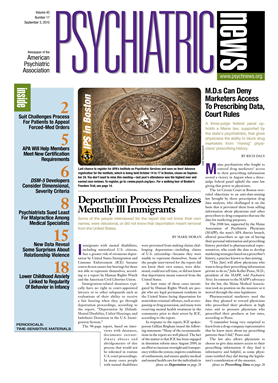Social anxiety, generally believed to be an affliction of younger people, is far from rare in seniors, a new study out of Sweden has found.
The lead investigator was Bjorn Karlsson, a final-year medical student at Sweden's University of Gothenburg, and the senior investigator was Ingmar Skoog, M.D., Ph.D., a professor of psychiatry at the university.
Their sample was 914 nondemented people aged 70 or older. Subjects were evaluated for social anxiety according to DSM-IV criteria. Out of the 914 subjects, 1.9 percent were determined to have social anxiety, and an additional 1.6 percent fulfilled criteria A, C, and D, but not B, for the condition. (Criterion A is marked, persistent fear of social situations; criterion B is that exposure to a feared social situation almost always provokes anxiety; criterion C is that the person recognizes that the fear is excessive, and criterion D is that feared social situations are avoided or endured with intense anxiety.) Thus 3.5 percent of the sample had social anxiety that caused social consequences.
Using this population sample in a multiyear follow-up, the researchers also found something else of interest: seniors who experienced social anxiety at some point did not necessarily do so later.
Out of the original sample of 914 people, 681 agreed to participate in the follow-up study, which lasted five years. A total of 612 subjects were still alive and dementia free five years later. The researchers then used baseline and follow-up findings for these 612 individuals to assess whether any of those who had had social anxiety at baseline still had it five years later.
They found that 21 (3.5 percent) had had social anxiety at baseline—that is, they met all four DSM-IV criteria for the condition or criteria A, C, and D, but not B. Five years later, 10 (48 percent of the 21) appeared to be free of social anxiety. Moreover, of the 73 individuals who had had subclinical social anxiety at baseline—that is, those who fulfilled criteria A and C, but not criteria B and D—43 (59 percent) did not have any social anxiety at followup. Thus about half the subjects who had been socially anxious at baseline were not so five years later.
“This finding was a bit surprising,” Karlsson told Psychiatric News, “since several cross-sectional population studies and prospective clinical studies have shown that social phobia is a chronic disorder with a low rate of spontaneous recovery....”
So what might explain the disappearance of the anxiety disorder symptoms in this population?
The subjects' recovery had nothing to do with antidepressant treatment, the researchers concluded. It could also not be explained by changes in interview style or interpretations of responses between baseline and five-year followup since interrater reliability was high, and the same person trained interviewers on both occasions.
One explanation, the researchers suggested, may be that subjects who found themselves in socially stressful situations at age 70 did not find themselves in such situations a few years later—say, because they were more isolated due to loss of a partner or to illness. Another possible explanation, Karlsson told Psychiatric News, was that because social anxiety is often comorbid with depression, and because depression can occur episodically, perhaps individuals who recovered spontaneously from depression also recovered spontaneously from social anxiety.
And still a third possible reason for the findings, the researchers noted, was that some socially anxious subjects simply “grew out” of the condition as they aged. The reason why the researchers think this might be the case is that the five-year cumulative incidence of social anxiety was higher among the younger subjects than among the older ones.
Results from the first study were published in the February 2009 American Journal of Geriatric Psychiatry. Results from the second were published in the July Acta Psychiatrica Scandinavica.
The studies were funded by the Swedish Research Council and other groups.
